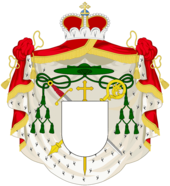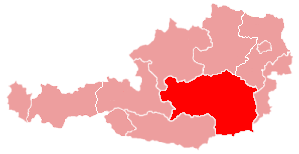Diocese of Graz-Seckau
| Diocese of Graz-Seckau | |
| Basic data | |
|---|---|
| Country | Austria |
| Ecclesiastical province | Salzburg |
| Metropolitan bishopric | Archdiocese of Salzburg |
| Diocesan bishop | Wilhelm Krautwaschl |
| Emeritus diocesan bishop | Egon Kapellari |
| Vicar General | Erich Linhardt |
| Episcopal Vicar | Heinrich Schnuderl |
| founding | 13th Century |
| surface | 16,401 km² |
| Parishes | 388 (2016 / AP 2017 ) |
| Residents | 1,231,865 (2016 / AP 2017 ) |
| Catholics | 855,800 (2016 / AP 2017 ) |
| proportion of | 69.5% |
| Diocesan priest | 308 (2016 / AP 2017 ) |
| Religious priest | 135 (2016 / AP 2017 ) |
| Catholics per priest | 1.932 |
| Permanent deacons | 77 (2016 / AP 2017 ) |
| Friars | 234 (2016 / AP 2017 ) |
| Religious sisters | 436 (2016 / AP 2017 ) |
| rite | Roman rite |
| Liturgical language | German |
| cathedral | Graz Cathedral |
| address | P.O. Box 872 Bischofplatz 4 8010 Graz |
| Website | https://www.katholische-kirche-steiermark.at/ |
| Ecclesiastical province | |

The Diocese of Graz-Seckau ( Latin : Dioecesis Graecensis-Seccoviensis ) is an Austrian diocese that belongs to the ecclesiastical province of Salzburg .
history
Diocese of Seckau


In 1218 the Archbishop of Salzburg, Eberhard II , founded the Seckau diocese, which was the third Salzburg suffragan diocese after Gurk (1072) and Chiemsee (1215) . In 1228, the fourth suffragan diocese, the Lavant diocese in St. Andrä in the Lavant Valley, followed .
Until 1782, the seat of the diocese was the former Upper Styrian Augustinian canons and now the Benedictine monastery Seckau ( Murtal district ) with the Seckau collegiate church as the cathedral church . The election and appointment of the Seckau bishop was the responsibility of the Salzburg archbishop . The Bishop of Seckau was also vicar for the Duchy of Styria.
The original, but by no means contiguous, territory comprised only 13 parishes and reached from Seckau via the Stubalpe to the Kainach Valley and again near Wildon to the Mur . From the beginning of the founding of the diocese, the Seckau bishops did not reside in the Upper Styrian monastery Seckau, but at Seggau Castle near Leibnitz in southern Styria , sometimes also in Graz . Most of the episcopal ordinations up to the 18th century also took place at Seggau Castle. Only the burial place of the bishops was in Upper Styria right next to the collegiate church of Seckau.
The bishops of Seckau carried the title of Prince-Bishop in the Holy Roman Empire . The use of this title and the use of the secular symbols of dignity associated with it (such as the prince's hat and coat ) was approved by Pope Pius XII in 1951 . also formally abolished.
Diocese of Graz-Seckau
In 1786 the bishopric was relocated to Graz, the previous parish church of St. Aegydius became the cathedral church of St. Aegydius in Graz Cathedral . With the annexation of the diocese of Leoben in 1859, the diocesan borders essentially correspond to those of today's federal state of Styria . For Lower Styria (part of Slovenia since 1919), the Lavant diocese was moved to Marburg in 1859 .
The diocese has been officially called Graz-Seckau since 1963 .
The appointment of the current Bishop of Graz-Seckau, Wilhelm Krautwaschl , by Pope Francis took place on April 16, 2015 and was announced on the same day in a bulletin of the Holy See . The episcopal ordination by the Archbishop of Salzburg , Franz Lackner OFM , took place on June 14, 2015 in Graz Cathedral.
Patronage
The diocesan patrons are St. Rupert and St. Virgil .
Articles of Incorporation
Pope Honorius III. permits the establishment of the diocese of Seckau on June 22, 1218.
King Friedrich II confirmed the founding of the diocese on October 26, 1218.
media
The Sunday paper (full name: Sunday paper for Styria ) is the weekly newspaper of the diocese of Graz-Seckau. Herbert Meßner has been its editor-in-chief since 1984 .
See also
literature
- Ernst Tomek: Church history of Austria . Tyrolia, Innsbruck - Vienna - Munich 1935–1959
- Josef Vodka: Church in Austria. Guide through their history . Herder, Vienna 1959
- Heimo Kaindl / Hans Ranz / Leopold Städtler / Karl Steiner (eds.): SCHLOSS SEGGAU. History, architecture and art of the Styrian bishop's castle . Diocesan Museum Graz, Graz 1997
- Karl Amon / Maximilian Liebmann: Church history of Styria . Styria, Graz a. a. 1997
Individual evidence
- ^ Franz Gall : Austrian heraldry. Handbook of coat of arms science. 2nd edition Böhlau Verlag, Vienna 1992, p. 219, ISBN 3-205-05352-4 .
- ^ Nomina del Vescovo di Graz-Seckau (Austria). In: Daily Bulletin. Holy See Press Office , April 16, 2015, accessed April 16, 2015 (Italian).
- ^ Graz: Wilhelm Krautwaschl consecrated bishop , orf.at, accessed on June 14, 2015.
- ↑ Wilhelm Krautwaschl is now the new Bishop of Styria , kleinezeitung.at, accessed on June 14, 2015.








